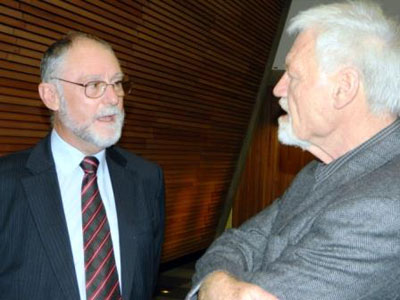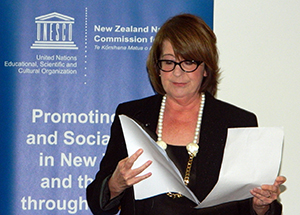
AUCKLAND (Pacific Media Watch): A New Zealand academic says the future of journalism lies in digital news media outlets which can be set up and run on a budget of less than NZ$250,000 per year.
Dr Gavin Ellis, media commentator, author and former editor-in-chief of The New Zealand Herald told the second annual UNESCO Press Freedom lecture at AUT yesterday that the huge private corporate media model which focussed increasingly on infotainment as a result of staff costs was not meeting the needs of readers.
Under the traditional private sector, profit-driven mainstream news model, "the front page dripping blood is the newspaper equivalent of an [unhealthy] breakfast cereal containing five spoonsful of sugar per serving," he added.
Readers were interested in socially important news as is demonstrated in Christchurch.
"The front page of The Press is less likely to feature attention-getting crime and emergencies than its metropolitan compatriots. That is because the citizens of Christchurch need to know about the reconstruction of their community. No-one would wish such a seismic catalyst on anyone but our communities need to be jolted out of complacency and begin to demand a prioritising of socially responsible journalism over True Crime," Dr Ellis said.
He said the solution could be found in new media platforms which would have "an over-riding commitment to socially responsible journalism" and likely be governed by trusts which would attract tax breaks.
"If they are committed to the retention of all ‘profits’ for the purposes of supporting and extending social purpose journalism, they should be entitled to tax dispensations plus incentives for donors willing to financially support them. This will require official recognition of certain types of journalism as a social purpose that can attract a newly created charitable status. ...organisations established or committed predominantly to the provision of certain types of journalism could demonstrate a social purpose that entitled them to tax concessions that would contribute toward their sustainability," he said.
Trust entities
"Papers like The Guardian, Irish Times and Tampa Bay Times in Florida were each owned by a "trust-like entity".
 Non-profit start-ups like ProPublica, the Centre for Investigative Reporting and the Center for Public Integrity in the United States, the Bureau of Investigative Journalism in London, the Australian Centre for Independent Journalism in Sydney, and the New Zealand Centre for Investigative Journalism were promising examples of what could be achieved.
Non-profit start-ups like ProPublica, the Centre for Investigative Reporting and the Center for Public Integrity in the United States, the Bureau of Investigative Journalism in London, the Australian Centre for Independent Journalism in Sydney, and the New Zealand Centre for Investigative Journalism were promising examples of what could be achieved.
The diminishing value of newspapers means they are being brought within financial reach of trusts but it was unlikely that any trust would want to start a print edition, which would be very costly, he said.
Dr Ellis said it was a "poor excuse" to argue that New Zealand was too small for such news outlets.
"If we say we're too small for that, then we're too small to do heart transplants," he said.
When asked if it would be feasible for multiple universities to fund these new models of journalism, Dr Ellis said that while there was potential in this, the new media outlets needed to reach out to a large audience if they were ever to replace the mass media.
The new trend towards setting up digital niche publications posed a danger of people only talking to other like minded people, he said.
Dr Ellis was introduced by the New Zealand National Commission of UNESCO board member Trish Carter, founding editor of the Al Jazeera English Asia-Pacific bureau, who also spoke about media freedom.
The lecture was jointly organised by the UNESCO NZ Commission and the Pacific Media Centre.
This work is licensed under a Creative Commons Attribution-NonCommercial 3.0 New Zealand Licence.




